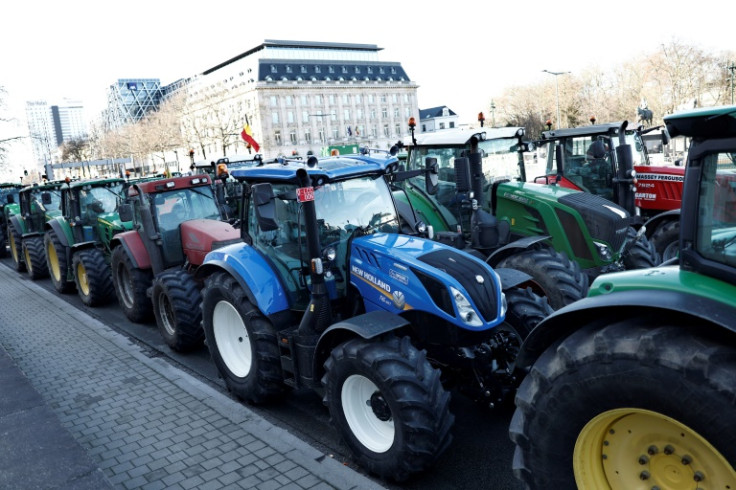
Farmers usually ride tractors around their farms. Tractors are the capital goods that make them more productive in producing essential food products. In the last couple of weeks, farmers have driven tractors away from farms onto highways that lead to national capitals.
From Greece to Italy, France, and Germany, tractors have become the farmers' "weapons" of a "war" against Brussels and national governments, protesting EU and domestic policies threatening their livelihood.
International Business Times interviewed Floris Bosscher, a Europe analyst at Sibylline, to learn about these policies and what the EU is doing to ease tensions.
Why are European farmers protesting?
The reasons for the farmer protests are both national and European in nature. What unites these protests is opposition to national and EU agricultural policies to make agriculture more sustainable. This includes national plans to cut subsidies on agricultural diesel (e.g., Germany, France, Greece) and European plans to decrease pesticides.
The availability of cheap Ukrainian agrarian products (e.g., grain), which the EU allowed on its market tariff-free, is of concern to European farmers, especially in Eastern Europe. The effects of climate change on harvests, inflation, and disagreements with supermarkets over fair prices have further exacerbated the concerns of EU farmers.
Why now?
The protests are taking place now for various reasons. One explanation is that they have a domino effect and inspire each other. Farmers frequently show solidarity or join protests in different European countries as they recognize each other's grievances. Simultaneously, the demonstrations coincide with the presentation and implementation of the 2024 national budget in various European jurisdictions. This triggered the late 2023 protest in Germany, which was predominantly national and focused on the government's plan to raise excise duty on agricultural diesel.
The protests also relate to the Agricultural and Fisheries Council meetings in December 2023 and January 2024. These high-level meetings between the various agricultural ministers of EU member states discuss the progress and implementation of Europe's Green Deal (agreed on in 2023), which includes discussions and agreements on policies to make the EU's agricultural sector more sustainable.
Finally, the protests are linked to the special EU Council meeting on Feb. 1 about Ukraine aid. In the meeting, the EU planned to decide on continuing free trade with Ukraine. The presence of all EU leaders also allows farmers to have their voices heard at the highest level.
What is the EU doing to solve the problem?
The EU is trying to quench the protests by various initiatives. It has already presented multiple concessions to farmers and has proposed to delay its agricultural policies so that farmers are exempted in 2024. This includes the proposal for farmers to set aside 3% of their arable land for biodiversity and non-productive elements, which was part of the Green Deal.
Moreover, the EU has pledged that it will want to continue free trade with Ukraine until June 2025. However, it has now included the possibility to limit or ban the sale of Ukrainian agricultural products in specific countries if it threatens the European or domestic market(s).
The European Commission had also announced holding its planned strategic dialogue on agriculture's future on Jan. 24 and 25. The dialogue was a direct meeting between European food chain organizations, NGOs, and EU representatives, and meant to depolarize the debates around the green transition in agriculture. It will occur every four to six weeks, with working groups addressing various questions surrounding the agricultural transition. The EU aims for a conclusion before September 2024, which is then to inform EU policy further.
Lastly, multiple countries, especially France, are lobbying the EU to take further steps, including canceling trade deals (e.g., Merocsur) with third countries that could indicate more competition for European farmers.







